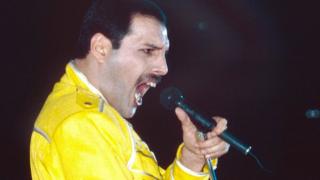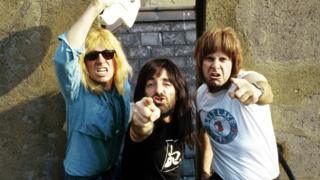 Image copyright
Image copyright
Getty Images
The song was originally recorded for the West End musical Time
A previously unheard Freddie Mercury track has premiered on BBC Radio 2, after a decade-long search for a lost vocal performance.
Time Waits For No One was originally part of the soundtrack to the 1986 West End musical Time.
The version released at the time featured the Queen star accompanied by dozens of layers of backing vocals.
But an early piano rehearsal of the song, featuring a different vocal take, has now been unearthed.
The song was written by Dave Clark, of 1960s pop group the Dave Clark Five – who felt the demo had a quality that was missing from the finished version.
“When we first recorded it, I went to Abbey Road and we ran through with just Freddie and piano. It gave me goosebumps. It was magic,” Clark told Radio 2’s Zoe Ball.
“Then we got down to recording the track and we [added] 48 tracks of voices, which had never been done in Abbey Road before, then the whole backing.
“It was fabulous – but I still felt there was something about the original rehearsal.”
After a decade-long search, Clark found the demo recording in 2017. After isolating Mercury’s voice, he brought in original keyboardist Mike Moran to record a new piano track.
The result is a fresh, stripped-back take that turns a spotlight on the raw emotion of Mercury’s vocal.
Clark described it as a “magic performance,” adding he “tasted every word”.
“It gave me the same goosebumps as when I first heard it.”
Image copyright
Getty Images
Time starred Cliff Richard and Sir Laurence Olivier (Sir Laurence Olivier not pictured)
Time was an ambitious, space-age musical, starring Cliff Richard as a rock star who must make the Earth’s case when the planet goes on trial before a galactic high court.
Featuring a holographic projection of Sir Laurence Olivier (as Akash, “the Ultimate Word in Truth”) it was ridiculed by critics, but ran for two years.
Mercury, however, declined a starring role in the production, saying: “For one thing, my darling, I don’t get up until 3pm, so I can’t do matinees.
“For another, when I do a show, I sing my butt off for three hours and then I drop dead. So it would be impossible to do eight shows a week.”
His recording of the title track was a minor hit in 1986, charting at number 32 in the UK.
- How Rami Malek became Freddie Mercury
- Brian May on 40 years of Bohemian Rhapsody: ‘I still listen to it in the car’
Clark and Mercury had been friends since 1976, when they met backstage at Queen’s concert in London’s Hyde Park; and remained close until Mercury’s death from Aids-related illnesses in 1991.
On the last night of Mercury’s life, Clark had taken over the bedside vigil from the singer’s former girlfriend, who was also his closest friend, Mary Austin.
Clark was alone with Mercury in the bedroom when he suddenly died.
“The doctor had been there half an hour before and said he’s got a few more days, so we didn’t expect he would die so soon,” he told the Daily Mail in 2011.
“We phoned Mary immediately. She lived just round the corner. It was unexpected otherwise she would have been there. She had the terrible task of phoning Freddie’s parents and sister to say he’d passed on.”
Image copyright
Getty Images
Freddie Mercury and Cliff Richard celebrate Dave Clark’s birthday in 1987
In the same interview, Clark lamented the fact that Mercury narrowly missed out on the widespread arrival of antiretroviral medication that might have saved his life
“Freddie had tried everything. He had special new medications flown in by Concorde from America. He said the next generation will be the ones to beat this. And the sad thing is if it had been 12 months later, he might have been okay when combination drug therapy first came in.”
Time Waits For No One is the first “new” music from Freddie Mercury since the box office success of the Bohemian Rhapsody biopic.
The 2014 compilation album Queen Forever, also featured a number of unreleased vocals by Mercury, including a duet with Michael Jackson.
The band have also hinted at the existence of several original songs recorded with David Bowie, during the sessions that produced their 1981 single Under Pressure.
Bohemian Rhapsody, released last year, is the most-successful music biopic in history, with box office takings of $903m.
Rami Malek, who played Mercury, won an Oscar and a Bafta for his show-stopping performance, including a recreation of the band’s iconic set at Live Aid in 1985.
“Freddie would have loved it,” said Clark. “He would have been smiling. It’s amazing and he deserves it.”
Follow us on Facebook, on Twitter @BBCNewsEnts, or on Instagram at bbcnewsents. If you have a story suggestion email entertainment.news@bbc.co.uk.












